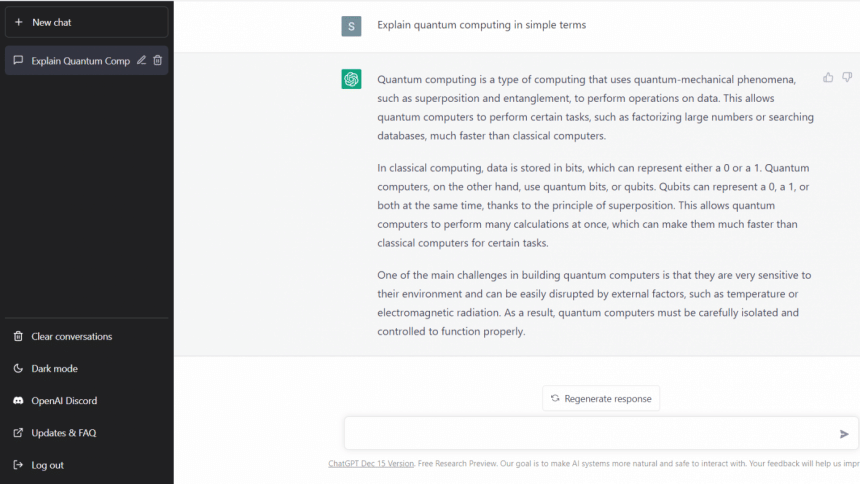ChatGPT: Everything you need to know about the new AI Chatbot

Artificial intelligence (AI) products have been dominating the headlines for the last several months. The recent hype surrounding AI arts has shown us a glimpse into the potential of AI in disrupting the creative industry. More recently, the launch of ChatGPT has taken the internet by storm and has decidedly marked a turning point for generative AI. If you have been behind the curve on this one, fear not, we are here to catch you up to speed! In this article, we have rounded up all the nitty-gritty details that you need to know about the viral sensation called ChatGPT.
What is ChatGPT?
ChatGPT is a chatbot in essence - but no ordinary chatbot whatsoever. The first thought that comes to your mind when you think of chatbots is perhaps a rudimentary tool that is only capable of answering frequently asked questions on corporate help desk pages. But ChatGPT is here to permanently change your perception of chatbots.
ChatGPT is a large language model that can automatically process and generate responses in a human-like manner. The chatbot lets you type open-ended questions about any topic, to which it gives answers that feel conversational rather than hand-coded.ChatGPT is powered by GPT-3.5, a language-generation software that has been designed to carry back-and-forth conversations with human users. It was trained on enormous volumes of data scraped off the web, then fine-tuned with human assistance to deliver more interactive and useful dialogue.
ChatGPT was developed by San Francisco-based OpenAI, a research company led by Sam Altman and backed by tech investors like Microsoft, Tesla Inc. CEO Elon Musk, and LinkedIn co-founder Reid Hoffman, among others. The company is a power player in the AI applications industry that is known for its breakthrough AI art generator DALL-E.
ChatGPT was released in late November and within only five days of its release, it reached one million users. To put this number into perspective, Netflix took 41 months, Facebook 10 months and Instagram 2.5 months to achieve this milestone. As the excitement about this chatbot is rising, so is the agitation regarding its future. While some observers are predicting that it will sound the death knell for human-generated writing, others are trumpeting it as an actual disruptive technology.
How can you use it?
If you want to try your hands at using this tool, the good news is, ChatGPT is free (for now at least). Just go to the ChatGPT website and click on the 'Try ChatGPT' option. As soon as you sign up with your email address and phone number, the chat page gets loaded. The page is fairly easy to navigate with an area where your results will show up and a text box where you can type your inquiries. There is a 'Regenerate response' button that you may click if you are not satisfied with the response you have received or if you want to opt for a different answer.
What can you do with this chatbot?
Since its launch, social media feeds have been flooded with users displaying ChatGPT's seemingly infinite uses, from generating poems for dating app matches to cheating on university assignments by generating essays. Here are some easy ways you can take advantage of this intelligent tool without breaching any ethical code.
First and foremost, you can prompt ChatGPT to explain complex concepts for you. For example, you may write: "Explain metaphysical philosophy." After you get an answer, for better understanding, you may write: "Explain it for a 10-year-old student" and voila, the chat has broken down the concept into layman's terms.
You can also use it to dash off and fine-tune your resumes and cover letters in just a few seconds. While you can crib from a lot of example copies on the internet, ChatGPT can help create a personalised copy and add a professional polish to your resume or cover letter.
You may utilise the chatbot to generate the first draft of a business proposal, email, or press release that you have to write in a little time. For example, you can ask ChatGPT: "Write me a press release for a consulting firm called X that has acquired company Y to bolster market leadership in cybersecurity." We would not recommend using the response as is, rather, you can use it as a baseline for your final draft.
You can prompt the chatbot tool to write and debug programming codes. It will save you the time and energy wasted on the tedious task of writing lengthy codes from scratch or finding a few bugs in your code. However, you still have to double-check to make sure the output is not buggy or insecure.
You can use the chatbot to make summaries of long-form content to get a quick overview of a topic. You can paste the text into ChatGPT and ask it "Shorten this text to three paragraphs while retaining the important details."
ChatGPT can come in handy if you are preparing for an interview. You can prompt the chatbot to generate some generate hypothetical scenarios in a job interview, possible questions that may be asked, convincing replies to those questions, and so on.
Last but not least, you may prod the chatbot to get a custom list of movies, books, or songs based on your preferences. For this, simply use, "Give me movie recommendations based on the fact that I loved 'Witness for the Prosecution.'"
When deploying the chatbot, however, keep in mind that it knows about information only through 2021, cannot browse the web live, and is prone to inaccuracies. So, it would be wise to not use the tool for anything crucial at its current stage. Also, make sure to verify the information it provides before using it.
Is it a good alternative to search engines?
While search engines respond to queries with links to relevant websites, ChatGPT presents information in a structured form without any link or citation, thus eliminating countless hours of research. However, since ChatGPT was built fundamentally as a large language model and not a traditional search engine, it does not have access to the same breadth and depth of information as other search engines.
In short, whether or not ChatGPT is a good alternative to search engines hinges on the specific needs and preferences of the users. It may be a useful option for those who value a more interactive and conversational search experience. But it may not provide satisfactory results for certain types of searches where you expect an array of options instead of a single simple answer to your question.
What does the future hold?
ChatGPT is still a work in progress and requires much more improvements in many areas. Though we cannot tell what the future versions may look like, it is clear that this is a peek into the future of infinite possibilities that AI products hold. Reams of reports show that ChatGPT is just the first of many similar chatbots that will be used extensively in our day-to-day life in the not-so-distant future.
Now that we are witnessing a meteoric rise of AI products, it is a good time to pause and assess: How can we use these intelligent tools safely and ethically? How can we prepare ourselves for the inevitable technological unemployment? How can we use these tools to help us think fast rather than rob us of the capability to think in the first place? Right now, we do not have clear answers to these questions. But these questions will be raised, again and again, as newer AI products keep making waves in the tech industry.

 For all latest news, follow The Daily Star's Google News channel.
For all latest news, follow The Daily Star's Google News channel. 








Comments